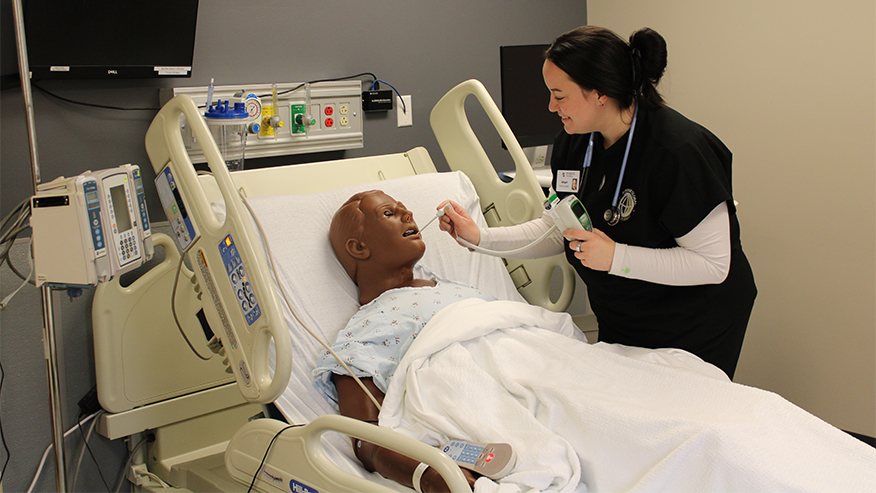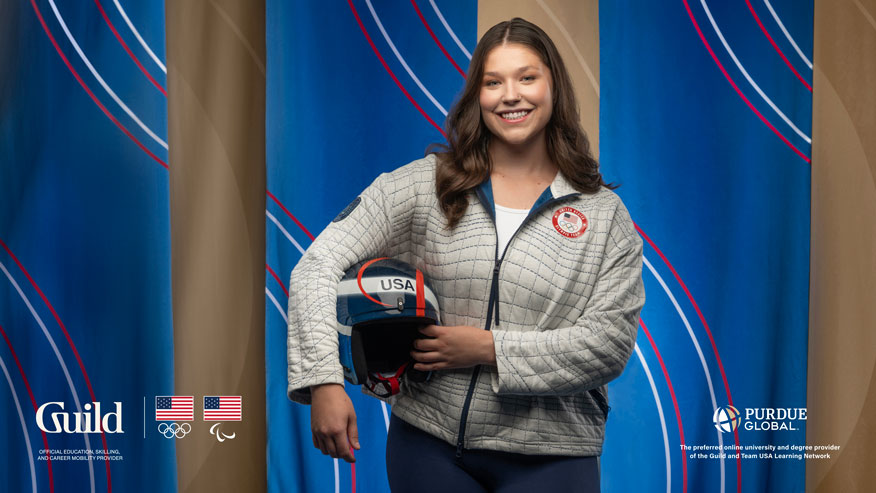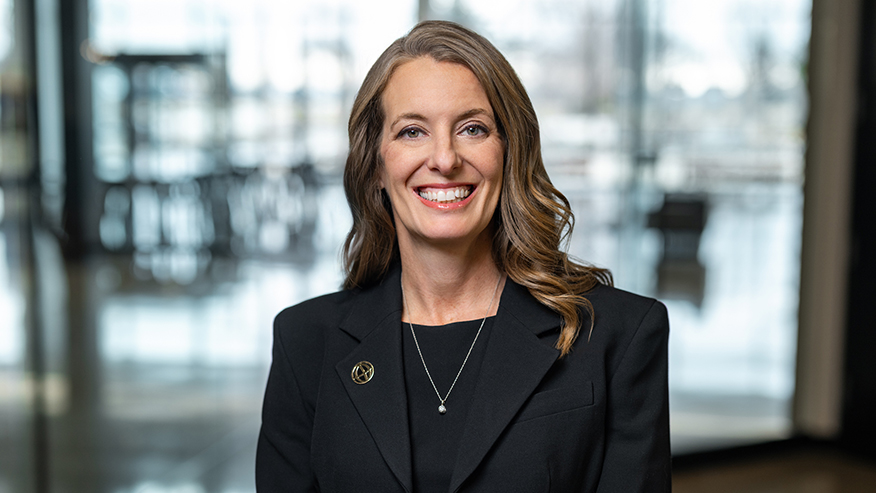Purdue Global to expand AI learning capabilities with launch of Learning Assistant
New resource embedded into online classroom platform

Purdue Global launched its new Purdue Global Learning Assistant pilot across four courses in January. The AI tool is directing students to resources for classes and projects. (Purdue Global photo/Kelsey Lefever)
WEST LAFAYETTE, Ind. —
Purdue Global professor Melissa Bahle welcomed a new teaching assistant to her composition classes this spring, helping field questions and providing answers while she is leading online classes.
The assistant’s name: Purdue Global Learning Assistant (PGLA), a new conversational AI tool designed to help students navigate and understand course resources and policies.
ADDITIONAL INFORMATION
- Purdue Global joins the Guild and Team USA Learning Network to provide higher education opportunities for Team USA athletes
- More than 1,500 Purdue Global graduates cap off college careers at commencement ceremonies
- Purdue Global: Don’t fear generative AI tools in the classroom
- Purdue Global’s student success coaching program to celebrate one year of addressing student needs, providing additional support
PGLA had a soft launch Jan. 31, with nearly 700 students across four sections of undergraduate and graduate courses piloting the new software.
Bahle is a professor in Purdue Global’s Department of English and Rhetoric who teaches two sections of CM 107 (College Composition I), each with 28 students enrolled.
“I think PGLA is a wonderful addition to the class,” she said. “I have noticed fewer course navigation questions. So far, PGLA seems to work well for questions related to finding materials in the course, providing information and links about APA formatting, and helping students connect with the Academic Success Center.”

Timothy Werth, Purdue Global’s chief information officer and vice president of Administrative Services, said that providing self-directed and immediate resources for students in the classroom is exactly what the PGLA is designed to do.
“We wanted to make sure the pilot courses would be good foundational building blocks for PGLA and representative of challenges facing our students and faculty,” Werth said.
The concept for PGLA came from the 2021 Purdue Global Moves strategic initiatives that address opportunities to improve student success, such as visioning for Purdue Global’s Classroom of the Future. Purdue Global is Purdue’s online university for working adults.
Several faculty and leadership members believe that supplementing online classrooms with real-time assistance to students could have, in the long run, a positive impact on learning outcomes for students.

Teams of developers, IT professionals, learning designers and faculty members began collaborating in 2021 on initial conceptualization. The group began the institutional design phase in fall 2022.
This tool’s development is focused on directly improving the Purdue Global teaching and learning experience. The development blueprint is grounded in student and faculty feedback issues.
“The excitement and engagement of our faculty has been a driving factor in our success during the product development life cycle. This is an academic project, not an IT project, that has clear outcome-based success criteria that everyone from faculty to finance can understand and evaluate. Every day, our faculty are bringing new problems to solve, which has resulted in a robust backlog of features that gets everyone excited about the future evolution of the Learning Assistant,” said Judy Lewandowski, vice provost for Adult Teaching and Learning.
Perfect timing of how a technology revolution assisted in tool development
As work groups were planning for PGLA, they encountered a technology revolution with the public release and adoption of generative AI programs.
And the work groups not only embraced the emergence of generative AI programs, they began including it in the design.
“We were methodical in our process to determine our next steps, which proved valuable as technologies available to Purdue Global were, and continue to be, changing rapidly,” Werth said. “The emergence of generative AI technologies using natural language models began to inform our potential path. In the fall of 2023, we decided the technologies were at a maturity level sufficient to embark on our vision to create the PGLA.”
With generative AI becoming more and more prevalent in the classroom, Purdue Global had to make sure what was being generated was correct for the students.
“The ability of any institution or organization to optimize AI is dependent upon the readiness of their data and processes to support an ‘AI first’ approach,” Werth said. “We expected challenges in this area, and we found them. Now it is about making incremental improvements as we move ahead.”

The three other courses — MT 140 (Introduction to Management), CJ 100 (Preparing for a Career in Public Safety) and ED 720 (doctoral course — Diversity, Equity, and Inclusion in Educational Contexts) — were selected for the pilot due to the number of students, plans of study and learning content.
Robert Winters, a professor in Purdue Global’s College of Social and Behavioral Sciences, teaches the CJ 100 course and participated in product testing.
Winters said PGLA’s interface is easy to use, and both he and his students are already seeing benefits.
“Pre-PGLA, students would either have to email me, as their professor, ask the question and then wait for me to respond, or wait to ask in our live weekly seminar, or often, just not ask and remain frustrated,” Winters said. “PGLA allows students to get answers 24/7 to their questions, on their time and need. When students use the tool, it helps to reduce the time that I need to spend either responding to emails or in seminars, time that can be better spent engaging students and teaching substantive content.”
Next steps: Continuous feedback
Faculty and student feedback is key to continued development, enhancement and scalability of the AI application. Focus groups will be created, and surveys will go out to the students. Developers are looking at feedback and interactions to see what other aspects could be tweaked or expanded.
Werth praises the course leads and faculty members who helped map user journeys in the initial version of PGLA.
“All faculty have been highly engaged and bring a deep knowledge of our classroom and gaps that exist that can be filled by the PGLA. They believe in this project, and they believe in the positive impact this will have on students over time,” Werth said.

Prior to launch, Bahle took time to ask PGLA questions about her courses. She attended two training sessions and now attends meetings twice a month with the larger working team, sharing how it is working with her students and brainstorming ways to make it more effective.
“I provided feedback on those answers that were not as thorough as they could be and noted when responses were helpful,” she said. “I worked on rewording questions to see how the responses from the program changed and worked on adjusting my seminars to dedicate time to discussing the PGLA with students and encouraging them to utilize it.”
Bahle looks forward to seeing how PGLA grows during the upcoming year.
“The more we work with it, the more effective it will be. I like that it is teaching students how to use AI as a tool when writing,” she said.
Winters also includes sections about PGLA in his seminars, encouraging students to use it.
“It is much easier for me to be able to talk to the entire class about PGLA than to have to field one student’s question and risk losing the attention of others because they do not have the same question,” Winters said.
Students are also responding positively to the additional tool, being able to get quick answers to basic course questions.
“From the student’s perspective, PGLA is like having me right there with them 24/7 to answer questions. That, in turn, lowers their stress level and allows them to more fully focus on learning their course content,” Winters said.
Werth believes the application will become more dynamic and valuable to the students as technology improves and problem-solving features are expanded. He hopes it becomes another trusted tool in our belt to improve student outcomes and persistence.
“The challenges of natural language models and accuracy are real, and we encounter something new each day,” he said. “It’s important that we keep an open mind and collaborate with our stakeholders all along the way to ensure this product delivers on our promise to drive Student Success.”
About Purdue Global
Purdue Global is Purdue’s online university for working adults who have life experience and often some college credits. It offers flexible paths for students to earn an associate, bachelor’s, master’s or doctoral degree, based on their work experience, military service and previous college credits, no matter where they are in their life journey. Purdue Global is a nonprofit, public university accredited by the Higher Learning Commission and backed by Purdue University. For more information, visit https://www.purdueglobal.edu.
Media contact: Matthew Oates, oatesw@purdue.edu, 765-496-6160, @mo_oates
Sources: Timothy Werth, Melissa Bahle, Robert Winters, Sam Weber, Judy Lewandowski



